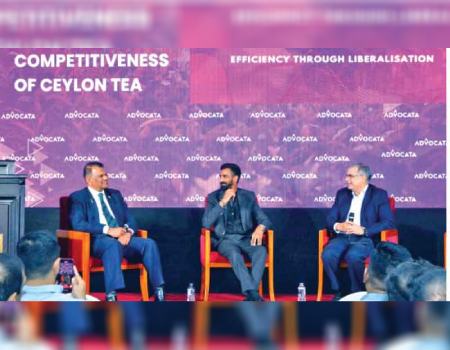
Please Share your Email if you Wish to Receive the Golden Tips & Tales Newsletter from History of Ceylon Tea Website

The challenges encountered by the upcountry Tamil community is beyond mere daily wages, said Minister of Water Supply and Estate Infrastructure Development, Jeevan Thondaman.
He was speaking at a discussion on “A Deep Dive into the market competitiveness of Ceylon Tea” organised by Advocata Institute at the BMICH on Thursday.
He stressed the importance of enhancing their quality of life by addressing various facets such as housing, land, education, health, and infrastructure.
He emphasised the importance of strengthening the economy of the estate workers.
Minister Thondaman acknowledged the historical significance of trade unions in advocating for workers’ rights, fair wages, and safe working conditions.
He said that the challenges confronting today’s workforce are unprecedented, driven by automation, artificial intelligence, and the gig economy, necessitating innovative adaptation by trade unions.
In parallel, Advocata Institute launched its latest report titled “Market Competitiveness of the Tea Industry of Sri Lanka” a few months ago. The report is written by Research Consultant at Advocata Institute, Sudaraka Ariyaratne.
The report begins with an introductory chapter that details the historical evolution of the island’s tea industry. The report states that the present standing of the industry in the context of the international market is not too grim, but argues that issues related to the labour market, capital investment, value addition, and quality control limit the industry’s competitiveness in the global stage.
The rest of the report consists of four discussion papers, each on the four areas of concern listed above, that present an economic theory-based lens to approach these issues, and discuss potential solutions.
It was also revealed that Sri Lanka has the highest cost of production in the world for tea production among Black Tea producing countries. Sri Lanka also has the highest labour costs. “Around 70% of Sri Lanka’s cost of production of tea comes from the labour costs,” said Hayleys Plantations Managing Director Dr. Roshan Rajadurai
In comparison other Black Tea producing countries such as India, Kenya and China only have around 40% – 50% of their total cost of production being made-up of labour. The importance of going for a revenue share system from the minimum wage system was also highlighted.
Comments
(In keeping with the objectives of this website, all COMMENTS must be made in the spirit of contributing to the history of this estate, planter or person i.e. names, dates & anecdotes. Critical evaluations or adverse comments of any sort are not acceptable and will be deleted without notice – read full Comments Policy here)